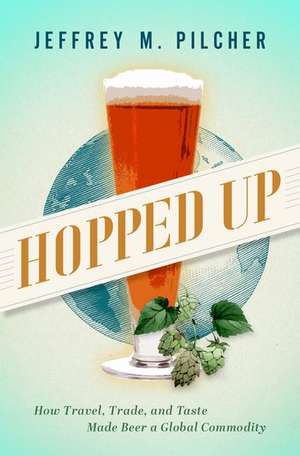Hopped Up: How Travel, Trade, and Taste Made Beer a Global Commodity
Autor Jeffrey M. Pilcheren Limba Engleză Hardback – 23 ian 2025
Preț: 184.42 lei
Preț vechi: 210.12 lei
-12% Nou
Puncte Express: 277
Preț estimativ în valută:
35.29€ • 36.94$ • 29.20£
35.29€ • 36.94$ • 29.20£
Carte disponibilă
Livrare economică 04-10 martie
Livrare express 04-08 martie pentru 60.09 lei
Preluare comenzi: 021 569.72.76
Specificații
ISBN-13: 9780197676042
ISBN-10: 0197676049
Pagini: 352
Ilustrații: 40 black and white illustrations
Dimensiuni: 152 x 147 x 33 mm
Greutate: 0.64 kg
Editura: Oxford University Press
Colecția OUP USA
Locul publicării:New York, United States
ISBN-10: 0197676049
Pagini: 352
Ilustrații: 40 black and white illustrations
Dimensiuni: 152 x 147 x 33 mm
Greutate: 0.64 kg
Editura: Oxford University Press
Colecția OUP USA
Locul publicării:New York, United States
Recenzii
An entertaining and wide-ranging case for beer. Hopped Up is a museum of pleasing curiosities.
Alcohol-and especially beer-has been at the center of human civilization from its very beginning. This entertaining, informative book uses beer as a powerful lens through which to view various historical trends over recent centuries, especially globalization and the backlash against it. Highly recommended.
Jeffrey Pilcher takes readers on an encyclopedic beer crawl around the globe and across many centuries. Even if you think you 'know' beer, you will likely find a surprise on every page. A tour de force.
There are few products whose history can be traced hand-in-hand with that of civilization on this planet. Beer, then, is quite unique. And there are few authors who have been able to convincingly and authoritatively detail the evolution of beer and brewing from the ancient Fertile Crescent to the complexities of the brewing business in these times of dramatic change. Pilcherâs book is a triumph.
A much-needed, wide-ranging, and occasionally polemical counterpunch to received wisdom on everything from the rise of pale lager to the spread of craft beer, and the movements, social, economic, political, and technological, that drove developments in beer and brewing over the centuries. Hopped Up will be essential reading for anyone wanting to understand the contemporary global beer scene and how we arrived where we are today.
Hopped Up is packed full of fascinating facts, from the origins of brewing to the rivalries that shaped British industrial beer brewing to the meaning behind the label 'Pilsner.' The stories in Hopped Up illustrate how, time and again, these kinds of interactions between brewers, regulators, and consumers have helped to create new beer cultures.
Because Hopped Up covers so much historical territory, I occasionally wished for a bit more depth. Nevertheless, it is a marvelous journey through the story of one of the world's most iconic beverages written by one of the world's most prominent scholars of food and drink. And it is a story that continues.
Alcohol-and especially beer-has been at the center of human civilization from its very beginning. This entertaining, informative book uses beer as a powerful lens through which to view various historical trends over recent centuries, especially globalization and the backlash against it. Highly recommended.
Jeffrey Pilcher takes readers on an encyclopedic beer crawl around the globe and across many centuries. Even if you think you 'know' beer, you will likely find a surprise on every page. A tour de force.
There are few products whose history can be traced hand-in-hand with that of civilization on this planet. Beer, then, is quite unique. And there are few authors who have been able to convincingly and authoritatively detail the evolution of beer and brewing from the ancient Fertile Crescent to the complexities of the brewing business in these times of dramatic change. Pilcherâs book is a triumph.
A much-needed, wide-ranging, and occasionally polemical counterpunch to received wisdom on everything from the rise of pale lager to the spread of craft beer, and the movements, social, economic, political, and technological, that drove developments in beer and brewing over the centuries. Hopped Up will be essential reading for anyone wanting to understand the contemporary global beer scene and how we arrived where we are today.
Hopped Up is packed full of fascinating facts, from the origins of brewing to the rivalries that shaped British industrial beer brewing to the meaning behind the label 'Pilsner.' The stories in Hopped Up illustrate how, time and again, these kinds of interactions between brewers, regulators, and consumers have helped to create new beer cultures.
Because Hopped Up covers so much historical territory, I occasionally wished for a bit more depth. Nevertheless, it is a marvelous journey through the story of one of the world's most iconic beverages written by one of the world's most prominent scholars of food and drink. And it is a story that continues.
Notă biografică
Jeffrey M. Pilcher is Professor of History and Food Studies at the University of Toronto. He is the author and editor of numerous books, including Planet Taco: The Global History of Mexican Food (OUP 2012), The Oxford Handbook of Food History (OUP 2012), and Food in World History.
